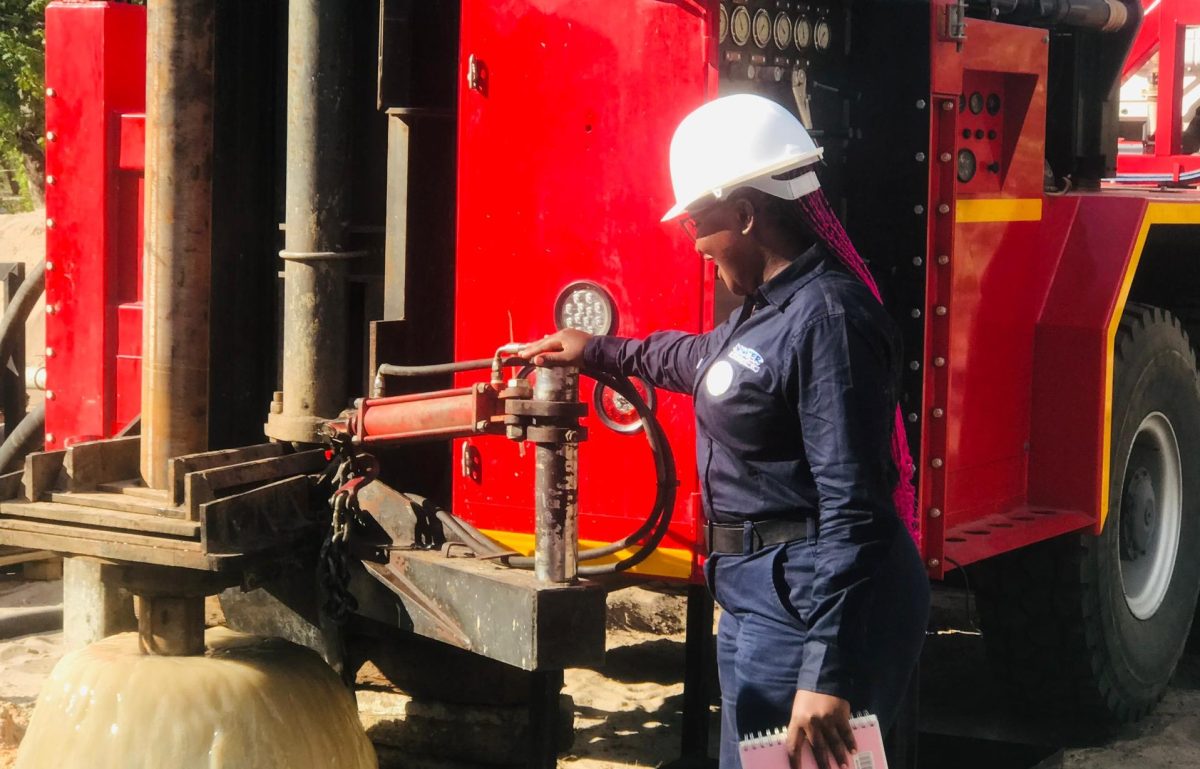Namibia: Bridging the Gender Gap in Groundwater Resources Management
Posted in : Blog on 20 November 2024

Alina Kadhila, a hydrogeologist at Namibia Water Corporation, operating a mud rotary drilling rig. Photo Credit: SADC-GMI
In the field of groundwater resources management, a pressing question often emerges: are we truly equipping women with the necessary tools and opportunities to thrive, or are we simply attempting to plug the gender gap without tackling the root causes of gender inequality and discrimination? Despite considerable progress in gender equality across various sectors, including science and technology, the underrepresentation of women in groundwater-related fields remains alarmingly high.
While progress has been made in bridging the gender gap in recent years, the statistics present a stark reality of the hurdles that women still encounter in entering and thriving in groundwater-related professions. Despite their equal capabilities and potential to contribute to the field, systemic barriers such as limited opportunities for career growth and pervasive gender biases persist, impeding women’s full participation. In addition to these structural hurdles, women in groundwater often face cultural norms and stereotypes that reinforce the idea of male dominance in scientific and technical fields.
For instance, women are often seen as more suited for lighter duties, while men are often considered more appropriate for physically demanding jobs, such as drilling or engineering work. Even when women are hired in these fields, they encounter resistance in being acknowledged and respected for their authority and expertise. In some cases, men may refuse to follow directives issued by women, viewing them as less authoritative solely because of their gender. This resistance not only undermines women’s contributions but also perpetuates the belief that women have no place in positions of leadership or decision making.
Reflecting on her work experiences, Alina Kadhila, a hydrogeologist at the Namibia Water Corporation, notes, “While progress has been made in recognizing the importance of gender diversity, there’s still a long way to go.” Societal norms and cultural beliefs thwart many efforts to promote gender equality. Entrenched stereotypes perpetuate the notion that certain professions are inherently male domains. “To address these challenges truly,” she asserts, “we need to challenge stereotypes, dismantle systemic biases, and create pathways for women to thrive.”
The main vehicle to achieve these goals is the OKACOM Strategic Action Program supported by various partners including the Cooperation for International Waters in Africa (CIWA Program). In keeping with OKACOM’s Gender Mainstreaming Strategy and Implementation Plan, OKACOM is also taking concrete action aimed at promoting gender equality and the empowerment of women and other vulnerable groups.
Phera Ramoeli, executive secretary of the Permanent Okavango River Basin Water Commission (OKACOM), echoes Kadhila’s sentiments, emphasizing the need for an integrated approach to gender equity. “Gender equality is not about promoting the interests of one gender over another,” he emphasizes. “It’s about creating a level playing field where everyone has equal opportunities to succeed.” Ramoeli advocates for empowering both girls and boys, nurturing a culture of inclusivity that transcends traditional gender norms.
He also highlights the importance of recognizing diversity’s inherent value to the groundwater sector. “Diverse perspectives foster innovation and drive progress,” he asserts. By embracing gender diversity, organizations can tap into a broader talent pool, resulting in more creative problem-solving and sustainable solutions to complex challenges. Encouragingly, as awareness about the benefits of diversity increases, there is a growing momentum toward fostering inclusive environments where all individuals, regardless of gender, can thrive.
Addressing societal norms and cultural beliefs that perpetuate gender disparities requires fundamental changes and multifaceted strategies. In the groundwater field, this involves reshaping perceptions through gender-sensitive educational programs in hydrogeology, which can debunk stereotypes and promote inclusivity from an early stage.
The goal of gender equality extends beyond closing the gender gap; it aims to foster a professional ecosystem where gender does not hinder success. Proactively addressing biases, promoting mentorship, and valuing women’s contributions equally to men’s are essential steps. Only then can we truly equip women with the tools for success and create a future where equality is a lived reality.
Learn more
Namibia Project Environmental and Social Management Plan (ESMP)
CIWA Program’s Gender and Social Inclusion Framework
CIWA’s SADC-GMI Sub Grant in Namibia
OKACOM Strategic Action Program
OKACOM Gender mainstreaming Strategy and Implementation Plan
CIWA Program Male Champions for Women’s Empowerment Initiative


